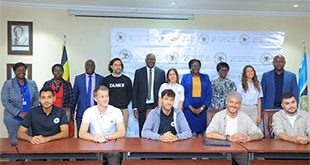
By Patrick Kagenda
Building of an inland dry port for Uganda, already bogged down by court battles over the tendering process and location, now faces challenges over allegations that it could create an inefficient monopoly and favour Kenya.
M/s Tumusime, Kabege & Co. Advocates acting on behalf of Uganda Inland port Ltd is suing the government of Uganda for allegedly fraudulently awarding a contract to CFS Great Lakes Company.
Uganda Inland Port Ltd won the tender from the Uganda Investment Authority to construct the port at Namanve 15kms east of Kampala City in 2001 but in December 2006 Ms Janet Mukwaya, the Minister for Tourism Trade and Industry, signed a contract with CFS Great Lakes Company to construct an inland port at Malaba on the Kenya-Uganda border. The Mukwaya-CFS agreement included an exclusivity clause barring others from operating an inland port in Uganda for 10 years. This is when trouble began.
“We are in full support of Uganda Inland Port Ltd blocking CFS Great Lakes Company which wants to create a monopoly that negatively affects other industrial players in the business,” said Kasim Omar, UCFA chairman.
“If you look at the group that was awarded the construction of the port, it is RVR today,” says Mr Enos Tumusiime, a former managing director of the Uganda Railways Corporation (URC) with wide knowledge of freight logistics.
RVR won a 25-year concession to manage the Mombasa “”Kampala railway, which is a critical economic lifeline for landlocked Uganda, but it has stumbled from one crisis to another because of lack of cash. It has also been accused of favouring its Kenyan operation to the disadvantage of Uganda.
“If they had all that much money why have they failed in the concession of running the Kenya-Uganda rail system?” Tumusime asked.
CFS Great Lakes Company is a Kenyan registered company with majority shareholders Mohammed Jaffer of Grain Bulk Handlers and Ashok Doshi of Doshi Iron mongers.
Mr Brown Ondego, who is the RVR chief executive chairman and group managing director of MJ Holdings is a CFS Great Lakes director.
Two Ugandans, Mr Godfrey Kirumira the patron of Kampala City Traders Association (KACITA) and Mr Tom Mugenga, a businessman and others are shareholders.
Cross-border transporters like Maersk, Multiple Haulers, Interfreight Panalpina, Transami, Kenfreight and major sector players like the Private Sector Foundation Uganda, Mukwano Industries and Uganda Railways Corporation oppose shifting the planned port from Namanve to Tororo.
“If and when this port is ever constructed at Tororo that will mark the end of the train coming to Kampala,” said Tumusime, “There is an inland dry port at Kisumu and another at Eldoret in Kenya, what was these people’s interest in having another port at Tororo close by the two in Kenya?”
“Did the government of Uganda consult with its neighbors Rwanda, Burundi, DRC, South Sudan and Tanzania which use the northern corridor about establishing this port? Why were they living out the southern route entry points at Jinja and Portbell from Mwanza,” asks Tumusime.
Building of the inland dry port is estimated at US $10 million (about Shs 18 billion but its estimated annual turnover of US $ 50 million (Shs 90 billion) that has investor jostling for control.
“The port was supposed to be a government of Uganda project and was to be financed by the Germany government at a cost of Euros 10 million in 1993,” says Enos Tumusime, who as former Uganda Railways Corporation Managing Director, was involved in the discussions. The Germany government, through its development bank Kfw, was to build a mini-container depot at the goods shade at Kampala railway station.
Calls to speed up the development of an inland dry port have been heightened by high demurrage fees at the Mombasa port.
Ugandan goods are expensive because of demurrage charges which are at US$25 (Shs 45,000) per container per day at the port of Mombasa and they are also subject to Kenyan taxes through rising bond fees at 1-2 % C.I.F.
In one incident, the Kenya government donated 7,000 vehicles to the government of South Sudan after Ugandan individuals and organisations failed to clear them from Mombasa port because of high demurrage fees.
KACITA petitioned President Yoweri Museveni demanding that the government builds a national inland dry port. That was in April 2004. To date nothing has been done.
Instead, two companies are in court battling over rights to develop and operate the dry port, the minister in charge is being accused of corruption, and traders are wondering while initial plans to have the port near Kampala were shelved in favour of Malaba.
“Our client had been given the exclusive rights of developing an inland dry port and government decided to turn around and award the same to another company,” Uganda Inland Port Ltd lawyers told The Independent, “our client spent $150,000 (Shs 240 million) doing a feasibility study of establishing the port and six sites had been identified zeroing on Namanve as the best site. Our clients concern was why had government decided to relocate the site of the port to Tororo and award the contract to another company. We questioned the motive of establishing the port at Tororo”.
Mr Sam Semanda, one of the three directors of Uganda Inland Port Ltd on April 4, 2007 swore an affidavit challenging the ministry’s allocation of Tororo Inland port exclusivity to CFS Great Lakes Company. The Commercial Court nullified the contract Trade minister Janet Mukwaya had signed between CFS Great Lakes Company and the government of Uganda and prohibited entering another contract.
In October 2007, Brown Ondego on behalf of CFS and the government of Uganda appealed to the Court of Appeal but it also dismissed the case on April 18, 2008 with costs awarded to Uganda Inland Port Ltd.
 The Independent Uganda: You get the Truth we Pay the Price
The Independent Uganda: You get the Truth we Pay the Price


